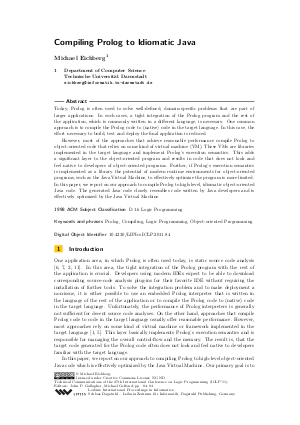Compiling Prolog to Idiomatic Java
Author Michael Eichberg
-
Part of:
Volume:
Technical Communications of the 27th International Conference on Logic Programming (ICLP'11) (ICLP 2011)
Part of: Series: Leibniz International Proceedings in Informatics (LIPIcs)
Part of: Conference: International Conference on Logic Programming (ICLP) - License:
 Creative Commons Attribution-NonCommercial-NoDerivs 3.0 Unported license
Creative Commons Attribution-NonCommercial-NoDerivs 3.0 Unported license
- Publication Date: 2011-06-27
File

PDF
LIPIcs.ICLP.2011.84.pdf
- Filesize: 0.98 MB
- 11 pages
Document Identifiers
Subject Classification
Keywords
- Prolog
- Compiling
- Logic Programming
- Object-oriented Programming
Metrics
- Access Statistics
-
Total Accesses (updated on a weekly basis)
0PDF Downloads0Metadata Views
Abstract
Today, Prolog is often used to solve well-defined, domain-specific problems that are part of larger applications. In such cases, a tight integration of the Prolog program and the rest of the application, which is commonly written in a different language, is necessary. One common approach is to compile the Prolog code to (native) code in the target language. In this case, the effort necessary to build, test and deploy the final application is reduced. However, most of the approaches that achieve reasonable performance compile Prolog to object-oriented code that relies on some kind of virtual machine (VM). These VMs are libraries implemented in the target language and implement Prolog's execution semantics. This adds a significant layer to the object-oriented program and results in code that does not look and feel native to developers of object-oriented programs. Further, if Prolog's execution semantics is implemented as a library the potential of modern runtime environments for object-oriented programs, such as the Java Virtual Machine, to effectively optimize the program is more limited. In this paper, we report on our approach to compile Prolog to high-level, idiomatic object-oriented Java code. The generated Java code closely resembles code written by Java developers and is effectively optimized by the Java Virtual Machine.
Cite As Get BibTex
Michael Eichberg. Compiling Prolog to Idiomatic Java. In Technical Communications of the 27th International Conference on Logic Programming (ICLP'11). Leibniz International Proceedings in Informatics (LIPIcs), Volume 11, pp. 84-94, Schloss Dagstuhl – Leibniz-Zentrum für Informatik (2011)
https://doi.org/10.4230/LIPIcs.ICLP.2011.84
BibTex
@InProceedings{eichberg:LIPIcs.ICLP.2011.84,
author = {Eichberg, Michael},
title = {{Compiling Prolog to Idiomatic Java}},
booktitle = {Technical Communications of the 27th International Conference on Logic Programming (ICLP'11)},
pages = {84--94},
series = {Leibniz International Proceedings in Informatics (LIPIcs)},
ISBN = {978-3-939897-31-6},
ISSN = {1868-8969},
year = {2011},
volume = {11},
editor = {Gallagher, John P. and Gelfond, Michael},
publisher = {Schloss Dagstuhl -- Leibniz-Zentrum f{\"u}r Informatik},
address = {Dagstuhl, Germany},
URL = {https://drops.dagstuhl.de/entities/document/10.4230/LIPIcs.ICLP.2011.84},
URN = {urn:nbn:de:0030-drops-31763},
doi = {10.4230/LIPIcs.ICLP.2011.84},
annote = {Keywords: Prolog, Compiling, Logic Programming, Object-oriented Programming}
}
